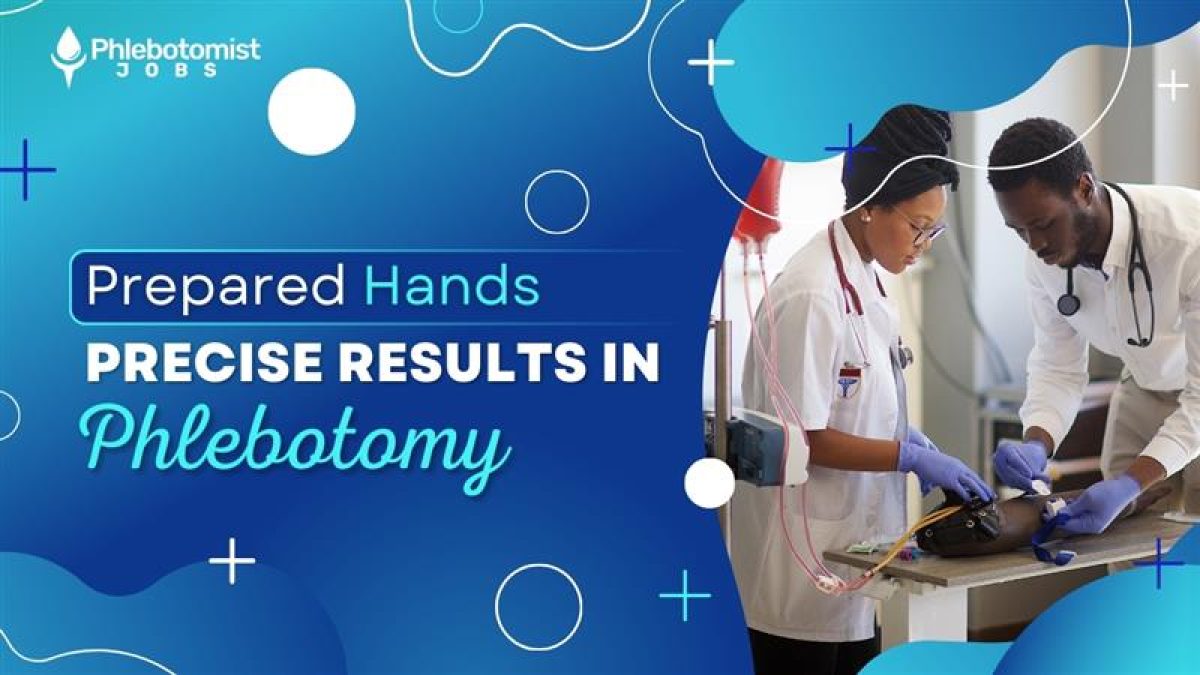Table of contents ▸
In the healthcare domain, drawing blood or collecting samples for analysis, donations, or research is indeed a crucial role celebrated by the work of the phlebotomist. If someone wishes to work as a phlebotomist or is searching for new phlebotomy positions, the question is often asked: Where can phlebotomists work? The answer is much more varied than generally accepted. Phlebotomy Jobs are not confined to hospital and clinic settings; instead, they extend into a plethora of settings, each offering varying opportunities for growth and specialization. This blog looks at the different workplaces in which a Professional Phlebotomist may work.
Hospitals and Medical Centers: The Core of Phlebotomy
Inpatient and Outpatient Settings
Hospitals remain the mainstay of employment for Professional Phlebotomists, with an estimated 36% of them working in this setting. Blood and other specimen collection is done in a highly paced atmosphere from patients of all age groups-neonates to geriatrics. Inpatient settings are high-paced situations where the phlebotomists might have to work with complex medical conditions or emergencies. Outpatient departments try to be as appointment-oriented a setup as possible with fewer distractions. Hospital Phlebotomy Jobs hold benefits such as competitive salaries, complete health plans, and career advancement opportunities.
Specialized Jobs in Hospitals
Phlebotomists working within hospitals might specialize in pediatric phlebotomy, oncology, or emergency care. Pediatric phlebotomists must be gentle to calm the fears of the young patients, whereas Phlebotomy Jobs in emergency rooms require quick thinking and precise action under pressure. Nurses with sufficient work experience can become supervisory phlebotomists who direct teams, prepare schedules, and ensure adherence to procedures. These types of supervisory Phlebotomy Jobs typically pay higher pay between $48,000 and $70,000 annually.
Diagnostic Laboratory: Precision and Skill
Medical and Clinical Labs
One of the other largest employers of phlebotomists working with nearly 34% of them-in diagnostic laboratories. Here are the placing, labeling, and preparation of specimens for testing that the well-trained phlebotomist would ensure were done correctly for the diagnosis of a disease such as diabetes or even high cholesterol. In these jobs, a lab phlebotomist has to be extremely detail-oriented so that specimens are correctly labeled and handled; otherwise, there could be mistakes. Salaries for phlebotomists in this realm range from $40,000 to $57,000, and there are opportunities to advance through credentials such as AMT-RPT.
Research and Development Labs
If you are into next-generation medical technology, phlebotomy in research and development laboratories presents a unique opportunity. These jobs are for sample collection in clinical trials or scientific investigations, often commanding a higher salary owing to the specialized nature of the work. Phlebotomists working in these environments interact with scientific personnel and may have to use cutting-edge instruments to distinguish themselves as an exciting option for those seeking Phlebotomy Jobs besides the usual patient care.
Blood Donation Centers: Making a Difference
Community and Mobile Donation Centers
Blood donation centers attract career aspirants as many of them allow entry-level applications. These centers function in the collection of blood or plasma for transfusion and medical treatments. Phlebotomist positions here may entail donor screening, venipuncture, and ensuring donors’ comfort, all while working in a community-based environment. Mobile donation centers, where phlebotomists may travel to the community and set up blood drives, certainly add some flexibility and variety to the job.
Donation Centers: Career Advancement Opportunities
In donation centers, Phlebotomy Jobs often include paid on-the-job training, thus opening opportunities for newly graduated Professional Phlebotomists Work. Organizations like the American Red Cross offer career advancement within structures with various positions, including donor screener to phlebotomy supervisor. Earn good wages, and phlebotomists feel that they have made some genuine contributions towards public health.
Private-Office Practices and Clinics: Personalized Care

Small-Scale Healthcare Settings
Private practices and outpatient clinics present Phlebotomist Jobs emphasizing patient interaction and patient care. Phlebotomists work in these sites can be called upon to perform some tasks, such as registering patients, answering phone calls, or managing lab records. These jobs are perfect for someone who enjoys a worksite atmosphere where relationships with patients can be cultivated.
Specialty Clinics
Specialty care clinics, oncologic or gastroenterologic, offer Phlebotomy Jobs-one of the greatest challenges. For example, at Katmai Oncology Group, phlebotomists do blood drawing and process specimens for tests like CBCs and CMPs for critical cancer care. These jobs require certification and provide career progress opportunities working closely with healthcare teams.
Traveling and Mobile Phlebotomy: Flexibility on the Move
Home/Homebound Visits
Phlebotomist travels perform services for home-bound patients who cannot make it to a healthcare facility: clients in nursing homes, long-term care facilities, or private residences, among others. Phlebotomy Jobs in this area generally require some kind of reliable transportation and a professional demeanor, with pay from $45,500 up to $60,500 annually. Phlebotomy Opportunities in this area are increasing with the aging population providing demand for in-home care.
Mobile Phlebotomy Startups
The cutting-edge startups are transforming Phlebotomist Jobs into flexible app-based platforms. Phlebotomists accept assignments around their schedule and perform venipuncture in various locations while putting in place and maintaining maximum standards for safety and hygiene. These Phlebotomy Opportunities are attractive for independent professionals seeking a competitive price per job.
Other Unique Settings: Expanding Horizons
Urgent Care and Community Health Centers
Urgent care centers and community health centers offer jobs for phlebotomists work that are fast-paced with community impact. Phlebotomists work here deal with a wide range of patients and are sometimes called upon for other duties, such as wound care or EKG testing. Since shifts can be fluid, such roles require flexibility but are excellent for gaining experience for Professional Phlebotomists looking into broadening their skill sets.
Instructor and Trainer Positions
Experienced phlebotomists work can become trainers who instruct students or new hires at institutions such as Careers Unlimited. These types of jobs utilize their skills to educate the next generation of Professional Phlebotomists work, rewarding a shift away from hands-on work toward education.
Conclusion
The question of where phlebotomists work turns up innumerable opportunities across the myriad settings. Be it hospitals and diagnostic laboratories or blood donation centers, private clinics, or mobile Phlebotomists Work, Phlebotomy Jobs provide flexibility, good payment, and scope for career growth. With the U.S. Bureau of Labor Statistics projecting an 8% growth in Phlebotomy Jobs from 2023 to 2033, the timing is ideal for giving these Phlebotomy Opportunities a look. Whether you’re a freshly minted Professional phlebotomist or keen to sharpen your specialty further, Phlebotomist Jobs offers a trusted platform to connect you with the best employers. The crux of the matter is to put your certifications to good use, network at medical job fairs, and keep your mind open toward varied workplaces to pick the option that best fits your needs.
Follow us on Social Media: LinkedIn | Facebook | Twitter | Instagram












